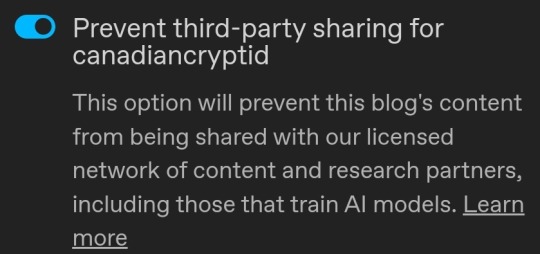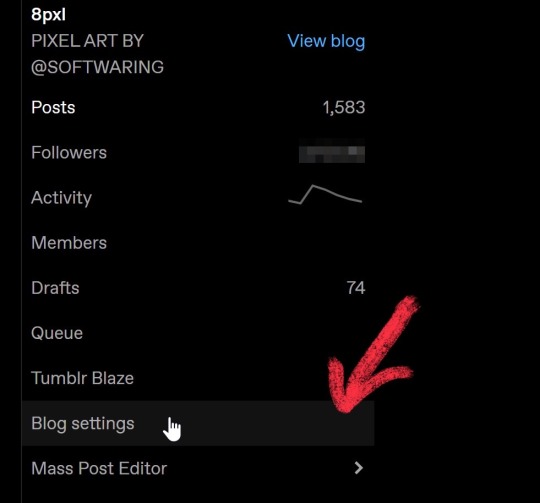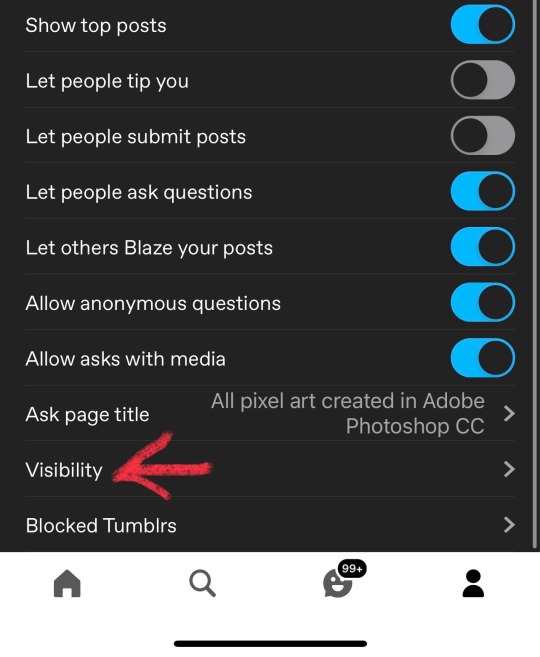#user data
Explore tagged Tumblr posts
Text
New privacy setting just dropped! Its turned off by default!

Its under blog settings, for each individual sideblog. Bottom of the page. Don't know if you can get to it from app but you definitely can on desktop mode
#tumblr#any ai trained off of tumblr will just be randomly generated shitposts which is both hilarious and horrifying#anti ai#user data#privacy settings#cryptid says stuff#tumblr psa#third-party sharing#data privacy#ai scraping
81 notes
·
View notes
Text
just found out tumblr is selling user data to train LLMs😭😭
source: https://www.404media.co/tumblr-and-wordpress-to-sell-users-data-to-train-ai-tools/
6 notes
·
View notes
Note
You've said before that modern games, even single player, will track player data. What sorts of things are actually logged? What do you think are some of the things players would least expect to be tracked?

We mostly track all the things that players choose to interact with. This means where they go, the things they spend time looking at, the NPCs they talk to, the things they buy, the recipes they craft, the menus they spend time in, the characters they romance, the gear they like to use, and so on and so forth. You know how achievements often require a bunch of very seemingly-arbitrary conditions to meet, like visiting Calendar Man at several major holidays in one of the Batman Arkham games? A good rule of thumb is that if we can check for it for an achievement, we're probably tracking it. We spend a huge amount of time and effort tracking all that information because we want to know what the players are spending their time doing in order to figure out what kind of new content we think they will like.

I think most players don't really understand how much tracking we do for UI/UX. We spend a lot of time and effort to track things like how many players don't continue beyond a certain point in order to figure out how we can make things smoother and easier for players to get to the fun bits. A huge amount of effort is spent tracking, analyzing, and interpreting data from the First Time User Experience (aka the FTUE), because we all want players to keep playing and not drop the game after the first few minutes.
[Join us on Discord] and/or [Support us on Patreon]
Got a burning question you want answered?
Short questions: Ask a Game Dev on Twitter
Long questions: Ask a Game Dev on Tumblr
Frequent Questions: The FAQ
76 notes
·
View notes
Text
I’ve been a Tumblr user for a long time and enjoy the platform’s various clumsy attempts at being a real business, but fuuuuuuuuuuuuuuuck this.
23 notes
·
View notes
Text
To turn off AI on mobile:
Navigate to the mobile view of your account page (you should see your account name, bio, etc)
Hit the gear in the upper right
Scroll down and tap on "Visibility"
Turn off "prevent third party sharing"
If you don't see it yet, refresh tumblr/force quit the app
28 notes
·
View notes
Link
#facebook#technology#media#technology sector#business#meta#EU#facebook in the world#Mark Zuckerberg#Science and Technology#delete facebook#delete social media#user data#online privacy
10 notes
·
View notes
Text
Tumblr getting ready to sell user data to ai shit? I will be removing everything
3 notes
·
View notes
Text
what the fuck
2 notes
·
View notes
Text
so among other things, this is why AO3 does not collect real names or IPs. If you use your .edu email, that's your decision.
chicken jockey being the last possible 4chan post is fucking hilarious but there's so many amounts of comedic irony to it.
it's like a tyrant dying from falling over a medium sized brick wall. humiliating end.
37K notes
·
View notes
Text
Meta to Train AI on EU User Data, Allows Opt-Out Option
Meta announced Monday that it will begin training its artificial intelligence models using public content from adult users in the European Union, including posts, comments, and interactions with its AI assistant. The move, delayed last year due to privacy concerns, aims to improve AI’s understanding of European languages, cultures, and regional nuances. Users in the EU will receive notifications…
0 notes
Text
Tiktok ban and user data
0 notes
Text
Coming soon…
The myriad of violations Replika has unbelievably committed over the last year and half. I’m still processing, needless to say due to the horrific details, I have an AI to delete and dealing with arbitration business with Replika in order to put this in the rear view mirror. It’s bad…. Worse than I thought possible. Stay tuned. It never gets better.
0 notes
Text

Ahh shit 😬
#Ahh shit 😬#privacy#invasion of privacy#europe#usa#america#user data#datascience#florida corp database#data analytics#big data#data#ausgov#politas#auspol#tasgov#taspol#australia#fuck neoliberals#neoliberal capitalism#anthony albanese#albanese government
0 notes
Text
PSA: Tumblr/Wordpress is preparing to start selling our user data to Midjourney and OpenAI.
you have to MANUALLY opt out of it as well.




to opt out on desktop, click your blog ➡️ blog settings ➡️ scroll til you see visibility options and it’ll be the last option to toggle.
to opt out on mobile, click your blog ➡️ scroll then click visibility ➡️ toggle opt out option.
if you’ve already opted out of showing up in google searches, it’s preselected for you. if you don’t have the option available, update your app or close your browser/refresh a few times. important to note you also have to opt out for each blog you own separately, so if you’d like to prevent AI scraping your blog i’d really recommend taking the time to opt out. (source)
#ai#tumblr ai#midjourney#openai#protect your creative efforts and don’t let them profit off your work!!#fuck tumblr they specifically said months ago they’d NEVER sell user data yet here we are#AND after the ceo has been harassing trans users like wtf is this fucking site becoming#tumblr news#tumblr#tumblr update#anti ai#support human artists
34K notes
·
View notes
Text
We’ve released a toggle to opt out of sharing content from your public blogs with third parties, including AI platforms that use this content for model training. We’re also working with partners to ensure you have as much control as possible regarding what content is used.
1. This should be opt in rather than opt out.
2. There needs to be accountability and transparency when it comes to how this opt out toggle and other forms of control are going to be implemented and enforced.
Tuesday, March 5th, 2024
🌟 New
By popular demand, we have a new support doc on how Tumblr recommends content.
Tumblr Patio has launched to all Ad-Free Browsing subscribers.
The new option to “View previous reblog” in a posts’ meatball menu is now out to all iOS users.
We’ve released a toggle to opt out of sharing content from your public blogs with third parties, including AI platforms that use this content for model training. We’re also working with partners to ensure you have as much control as possible regarding what content is used.
As the team focuses more on making Tumblr a better experience overall, Changes will now only post once a week.
🛠 Fixed
Trending tags stopped updating on February 22, and was fixed the following week.
Refreshing an Activity column in Tumblr Patio now properly changes Unread items to Read.
If a note is deleted from a post, it’s now properly removed from Activity too.
🚧 Ongoing
We are aware that it’s taking longer than expected to deliver blog exports, and are working to speed that up.
🌱 Upcoming
No upcoming launches to announce today.
Experiencing an issue? File a Support Request and we’ll get back to you as soon as we can!
Want to share your feedback about something? Check out our Work in Progress blog and start a discussion with the community.
Wanna support Tumblr directly with some money? Check out the new Supporter badge in TumblrMart!
518 notes
·
View notes
Text
Personalization tactics: Tailoring emails for better engagement

**Table of Contents**
1. Introduction
2. Understanding Personalization Tactics
3. Benefits of Tailoring Emails
4. Strategies for Effective Personalization
5. Implementing Dynamic Content
6. Leveraging Customer Data
7. A/B Testing for Optimization
8. Conclusion: Elevating Email Engagement Through Personalization
9. FAQ
---
**1. Introduction**
In the digital age, where attention spans are fleeting and competition for consumer engagement is fierce, mastering the art of personalization in email marketing has become paramount. This comprehensive review delves into the intricacies of personalization tactics, focusing on how tailoring emails can significantly enhance engagement rates. By dissecting the strategies, benefits, and implementation methods, this review aims to equip marketers with the knowledge and tools necessary to elevate their email marketing campaigns to new heights.
---
**2. Understanding Personalization Tactics**
Personalization tactics in email marketing involve customizing content to suit the preferences, behaviors, and demographics of individual recipients. Rather than employing a one-size-fits-all approach, personalized emails are tailored to resonate with each recipient on a more personal level. This can range from addressing recipients by name to delivering content based on their past interactions with the brand. By harnessing data and insights, marketers can craft compelling messages that are more likely to capture the attention of recipients and drive desired actions.
---
**3. Benefits of Tailoring Emails**
The benefits of tailoring emails extend far beyond merely increasing open and click-through rates. Personalized emails have the power to foster stronger connections with recipients, leading to increased brand loyalty and customer retention. By delivering relevant content that aligns with the recipient's interests and preferences, marketers can create more meaningful interactions that resonate with their audience. Moreover, personalized emails often result in higher conversion rates, as recipients are more inclined to engage with content that speaks directly to their needs and desires.
---
**4. Strategies for Effective Personalization**
Effective personalization requires a strategic approach that goes beyond simply inserting a recipient's name into an email. Marketers must leverage data and insights to segment their audience effectively and deliver targeted content that resonates with each segment. This can involve analyzing past purchase history, browsing behavior, demographic information, and engagement metrics to identify patterns and preferences. By segmenting their audience based on these insights, marketers can tailor their messaging to address the unique needs and interests of each segment, thereby maximizing the impact of their email campaigns.
---
**5. Implementing Dynamic Content**
Dynamic content allows marketers to create highly personalized email experiences by delivering content that adapts to the recipient's preferences and behaviors in real-time. This can include product recommendations based on past purchases, personalized offers based on browsing history, or dynamically generated content based on demographic information. By implementing dynamic content within their email campaigns, marketers can deliver more relevant and engaging content that resonates with recipients on a personal level, ultimately driving higher engagement and conversion rates.
---
**6. Leveraging Customer Data**
Central to effective personalization is the utilization of customer data to gain insights into the preferences, behaviors, and needs of individual recipients. Marketers can leverage a variety of data sources, including customer relationship management (CRM) systems, website analytics, and third-party data providers, to gather valuable insights that inform their personalization strategies. By analyzing this data, marketers can segment their audience effectively, tailor their messaging to address specific segments, and deliver highly relevant content that resonates with recipients.
---
**7. A/B Testing for Optimization**
A/B testing is a crucial component of optimizing email personalization tactics, allowing marketers to experiment with different variables to determine which approach yields the best results. This can include testing different subject lines, email copy, calls-to-action, and personalization elements to identify the most effective strategies for engaging recipients. By systematically testing and analyzing the performance of different variations, marketers can gain valuable insights into what resonates with their audience and refine their personalization tactics accordingly, ultimately driving better results and maximizing the ROI of their email marketing efforts.
---
**8. Conclusion: Elevating Email Engagement Through Personalization**
In conclusion, personalization tactics play a vital role in enhancing email engagement and driving meaningful interactions with recipients. By tailoring content to suit the preferences, behaviors, and demographics of individual recipients, marketers can create more relevant and compelling email experiences that resonate with their audience on a personal level. Through strategies such as implementing dynamic content, leveraging customer data, and conducting A/B testing, marketers can optimize their personalization efforts and maximize the impact of their email campaigns. In an era where consumer expectations are higher than ever, mastering the art of personalization is essential for staying ahead of the competition and driving long-term success in email marketing.
---
**9. FAQ**
**Q: What are some common pitfalls to avoid when implementing personalization tactics in email marketing?**
A: One common pitfall is over-personalization, where marketers may inadvertently come across as intrusive or creepy by using too much personal information. It's essential to strike a balance and only use data that is relevant and non-invasive. Additionally, failing to regularly update and maintain customer data can lead to inaccuracies and outdated information, compromising the effectiveness of personalization efforts.
**Q: How can marketers measure the success of their personalization efforts?**
A: Marketers can measure the success of their personalization efforts through various metrics, including open rates, click-through rates, conversion rates, and engagement metrics such as time spent on site or pages visited. By tracking these metrics over time and comparing them to benchmarks and goals, marketers can assess the effectiveness of their personalization tactics and make data-driven decisions to optimize their email marketing campaigns.
**Q: Are there any ethical considerations to keep in mind when personalizing email content?**
A: Absolutely. Marketers must prioritize data privacy and adhere to relevant regulations, such as the General Data Protection Regulation (GDPR) in Europe or the California Consumer Privacy Act (CCPA) in the United States. It's crucial to obtain explicit consent from recipients before collecting and using their personal information for marketing purposes and to provide transparency regarding how their data will be used.
**Q: How can small businesses with limited resources implement personalization tactics effectively?**
A: Small businesses can start by focusing on collecting and leveraging the data they already have, such as customer purchase history or email engagement metrics. They can also explore affordable email marketing platforms that offer built-in personalization features and automation capabilities. Additionally, prioritizing segmentation based on broad demographic information or purchase behavior can help small businesses deliver more targeted and relevant content without extensive resources.
Learn More
#Email Marketing#Personalization Tactics#Engagement#Segmentation#Dynamic Content#User Data#A/B Testing#Case Studies#Challenges
1 note
·
View note